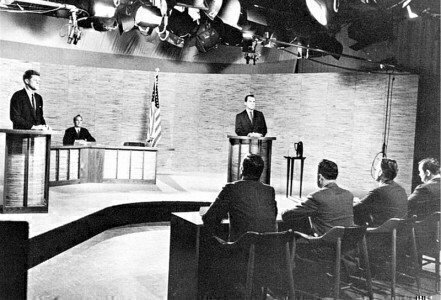Who Was Makeup Man For Nixon At Kennedy Nixon Debate 1960
September 26, 1960 is the day that inverse part of the mod political landscape, when a Vice President and a Senator took function in the first nationally televised presidential debate.
 The Vice President was Richard Thou. Nixon and the U.S. Senator was John F. Kennedy. Their kickoff televised debate shifted how presidential campaigns were conducted, equally the power of television took elections into American'due south living rooms.
The Vice President was Richard Thou. Nixon and the U.S. Senator was John F. Kennedy. Their kickoff televised debate shifted how presidential campaigns were conducted, equally the power of television took elections into American'due south living rooms.
The debate was watched live by lxx million Americans and information technology made politics an electronic spectator sport. It also gave many potential voters their showtime chance to see actual presidential candidates in a live surroundings, as potential leaders.
The importance of the event tin't be underestimated. Before 1960, in that location were candidates who debated (Abraham Lincoln and Stephen Douglas were 19th century examples) and there were candidates who appeared on television. And there were candidates who went out on the trail and "stumped" for votes, appearing in public at pre-arranged events or at whistle-stop tours on trains.
But almost voters never had a take chances to see candidates in a close, personal way, giving them the opportunity to class an stance about the next president based on their looks, their voice and their opinions.
Going into the debate, Nixon was the favorite to win the election. He had been President Dwight Eisenhower's vice president for eight years. Nixon had shown his mastery of television in his 1952 "Checkers" spoken language, where he used a televised address to deflate slush-fund allegations, and secure his vice presidential slot by talking about his pet domestic dog, Checkers. Nixon had as well bested Soviet leader Nikita Khrushchev in the famous Kitchen Debate.
Kennedy was the photogenic and energetic young senator from Massachusetts who ran a calculated principal campaign to best his main rival, Senator Lyndon Johnson. Merely Kennedy had debate experience in the primaries and said, "Nixon may accept debated Khrushchev, but I had to debate Hubert Humphrey."
The contend took place in Chicago and CBS assigned a 38-year-old producer named Don Hewitt to manage the event. Hewitt went on to create "60 Minutes" for CBS. The highly promoted event would pre-empt "The Andy Griffith Show" and run for an 60 minutes. Hewitt had invited both candidates to a pre-production coming together, just just Kennedy took up the offer.
When Nixon arrived for the contend, he looked ill, having been recently hospitalized because of a knee injury. The vice president so re-injured his knee as he entered the TV station, and refused to call off the contend.
Nixon also refused to article of clothing stage makeup, when Hewitt offered information technology. Kennedy had turned downwardly the makeup offer first: He had spent weeks tanning on the campaign trail, but he had his own team do his makeup simply earlier the cameras went live. The consequence was that Kennedy looked and sounded good on television, while Nixon looked stake and tired, with a five o'clock shadow bristles.
The next mean solar day, polls showed Kennedy had go the slight favorite in the general election, and he defeated Nixon by one of the narrowest margins in history that November. Before the debate, Nixon led by six percentage points in the national polls.
There were three other debates between Nixon and Kennedy that autumn, and a healthier Nixon was judged to have won ii of them, with the last contend a draw. However, the last three debates were watched by xx million fewer people than the September 26th event.
In the aftermath of the kickoff debate, Nixon's running mate, Henry Cabot Guild, had a few choice words for the GOP presidential candidate. "That son-of-a-bowwow just lost us the election," Gild reportedly said. Johnson, who was Kennedy's running mate, thought his running mate had lost the debate. Order saw the fence on TV, while Johnson listened to the argue on the radio.
The issue's aura of being a game changer was so strong that in the following three campaigns, the sitting president refused to argue whatever challenger. Information technology was Gerald Ford in 1976 who established the current tradition of televised presidential debates in every general election.
Ford became the first sitting president to accept part in a televised contend. During his second argue with Jimmy Carter in San Francisco, President Ford said, "There is no Soviet domination of Eastern Europe." The gaffe was seen as a key factor in Carter'south win over Ford.
Presidential debates became a fixture in 1980, after the GOP challenger, Ronald Reagan, used a strong debate performance just a week earlier the ballot to win by a comfortable margin over Carter.
Source: https://constitutioncenter.org/blog/the-debate-that-changed-the-world-of-politics
Posted by: chamblisswaregs.blogspot.com

0 Response to "Who Was Makeup Man For Nixon At Kennedy Nixon Debate 1960"
Post a Comment